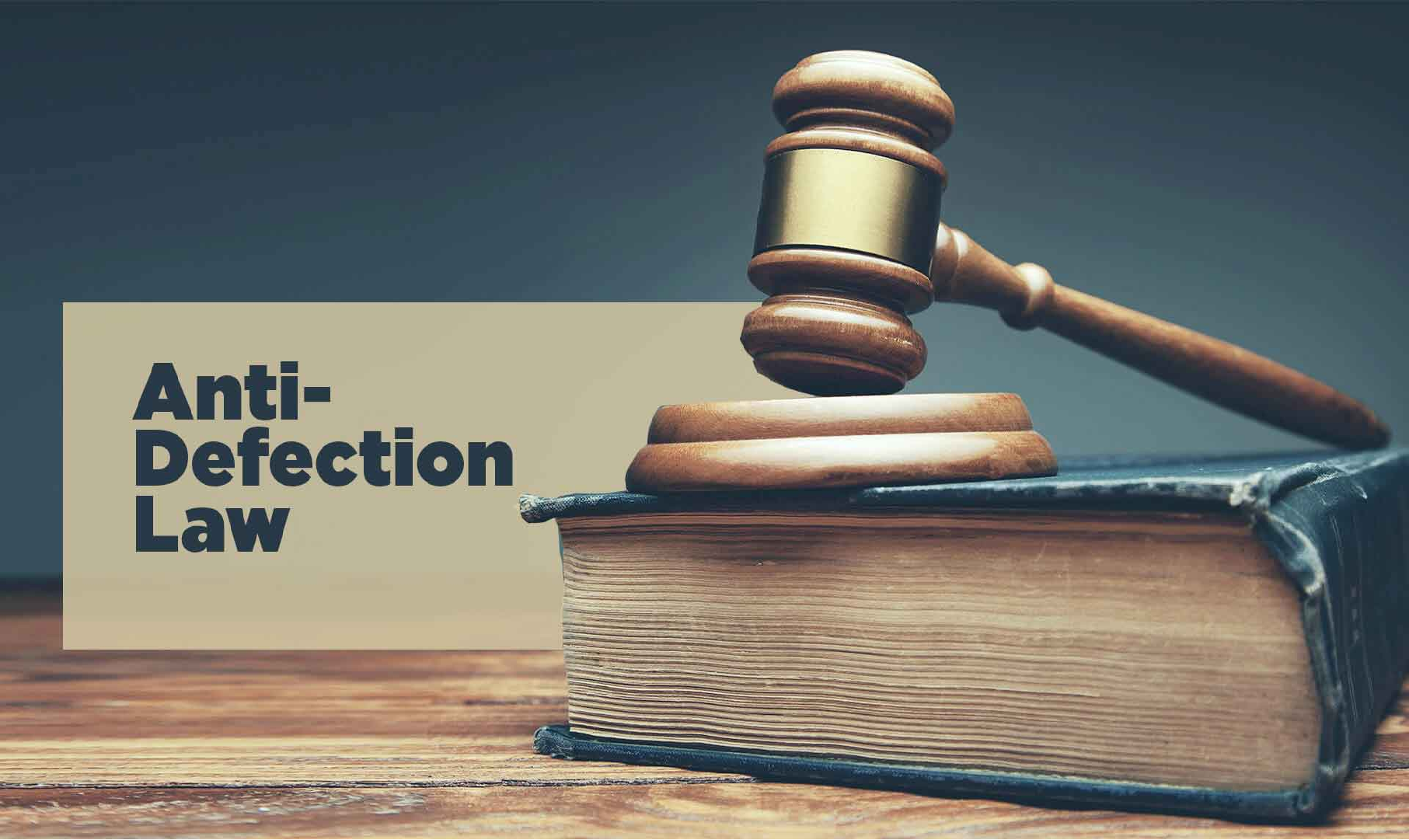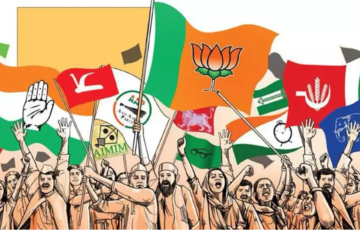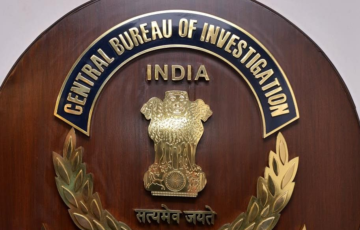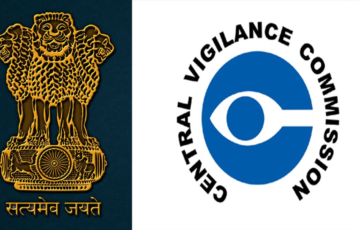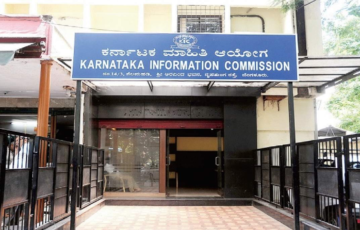ANTI-DEFECTION LAW
Introduction
- Elections are fundamental to democracy, and political parties with diverse ideologies are essential to its vitality. However, party defections remain a concern, leading to the introduction of the anti-defection law (Tenth Schedule) to protect democratic principles. While it has reduced individual defections, mass defections persist, raising concerns about its impact on legislators’ independence and decision-making, as it often centralizes power within party leaders. Balancing party discipline with the autonomy of elected representatives is crucial for a thriving democracy.
“Defection”
- In general, defection means leaving one association to join another. In the political scenario, it is a situation where a member of a political party leaves his party and affiliates with other parties. Traditionally, this phenomenon known as “party switching”, originated in the British House of Commons, where a lawmaker switches allegiance when switching parties from the government to the opposition, or vice versa.
‘Defections in India’
- The Historical Prevalence of Defections: The practice of political defections in India has a long and storied history, often leading to political instability and uncertainty. Defections tend to shift the focus from governance to the formation of governments, and this phenomenon has been prevalent in Indian politics for decades.
- The “Aaya Ram, Gaya Ram” Era: During the 1960s, the infamous “Aaya Ram, Gaya Ram” slogan was coined to describe the continuous switching of allegiances by legislators. This period marked a significant chapter in the history of political defections in India.
- Origins of Defections in the Central Legislature: The history of defections in India can be traced back to the days of the Central Legislature when Shri Shyam Lai Nehru, a member of the Central Legislature, changed his affiliation from the Congress Party to the British side, laying the groundwork for defections in Indian politics.
- The Proliferation of Defections in the Late 1960s: In the late 1960s, the phenomenon of legislators changing their political party affiliation for reasons other than ideology became widespread in Indian politics. The Chavan Committee Report of 1969 sheds light on this pivotal period.
- The Chavan Committee Report: According to the Chavan Committee Report (1969), following the Fourth General Elections, there was a surge in instances of legislators changing their party allegiance in a short period between March 1967 and February 1968. The Indian political landscape was characterized by numerous instances of change of party allegiance by legislators in several states.
- The Role of Power and Office: Notably, the lure of holding office and positions played a predominant role in legislators’ decisions to defect. Out of the legislators who defected, a significant number were included in the Councils of Ministers, which they helped to form through these defections.
- Implications for Political Stability and Governance: This trend underscored the significant influence of power and positions in motivating defections, adding to the challenges of political stability and governance in India. The historical prevalence of defections has had a lasting impact on the country’s political landscape.
- Rationale for curbing defections: The Statement of Objects and Reasons of the Bill, which added the Anti-Defection Law to the Constitution, mentioned that the evil of political defections was a matter of national concern and needs to be curbed. The National Commission to Review the Working of the Constitution (2002) had also noted that since candidates get elected on the basis of the party that gave them the ticket, defecting flouts the very mandate on the basis of which a member was elected.
Provisions Under the Anti-Defection Law
- Regulations of the Tenth Schedule on Disqualification for Defection: The Tenth Schedule of the Indian Constitution lays out specific regulations regarding the disqualification of members of Parliament and state legislatures for defection, which are designed to maintain party discipline and the integrity of the political system.
- Disqualification of Members of Political Parties: A member of a House who belongs to any political party faces disqualification if:
- They voluntarily give up their membership in such a political party.
- They vote or abstain from voting in such House contrary to any direction issued by their political party without obtaining prior permission from the party, and such act has not been condoned by the party within 15 days.
- This condition essentially mandates that a member elected on a party ticket must remain loyal to the party and adhere to the party’s rules. Defying party directives without proper authorization can lead to disqualification.
- Independent Members: An independent member of a House who was elected without being nominated as a candidate by any political party is prohibited from continuing to serve in the House. In other words, they cannot join a political party after being elected as an independent member.
- Nominated Members: A nominated member of a House faces disqualification if they join any political party after six months from the day they take their place in the House. This means that nominated members have a window of six months during which they can choose to join a political party without the risk of disqualification.
- These regulations are put in place to ensure that members of Parliament and state legislatures remain true to the political affiliations and mandates under which they were elected, thereby upholding the principles of party loyalty and accountability within the Indian political system.
Exemption
- Merger of Elected Members: If two-thirds of the elected members of a political party decide to merge into another party, neither the members who decide to join the new party nor the ones who choose to remain with the original party will face disqualification. This provision allows for the recognition of political realignments through a democratic process.
- Resignation and Rejoining for Chairman or Speaker: Any person elected as Chairman or Speaker can resign from their political party and rejoin the same party if they abandon the post. This provision recognizes the unique role and responsibilities of these positions and allows for flexibility in party affiliation.
- Change in Rules Regarding Splitting of Political Parties: While earlier, the splitting of political parties was permitted, the current provisions disallow such splits. This change in rules is designed to maintain political stability and prevent arbitrary and frequent division of political parties, which can lead to instability and frequent changes in government.
- Nominated Members’ Option to Join a Party: Nominated members who are not members of any political party have the option to join a party within six months from the day they take their place in the House. After this six-month period, they are treated as either a party member or an independent member, based on their choice or actions.
NOTE:
The provision of the Tenth Schedule pertaining to exemption from disqualification in case of split by one-third members of legislature party has been deleted by the 91st Amendment Act of 2003. It means that the defectors have no more protection on grounds of splits.
Power to Disqualify Under the Tenth Schedule
- The Tenth Schedule of the Indian Constitution outlines the authority responsible for making decisions on disqualification due to defection, ensuring a fair and consistent process.
- Speaker or Chairman’s Final Decision: The decision on questions of disqualification based on defection is typically referred to the Speaker of the Lok Sabha (House of the People) or the Chairman of the Rajya Sabha (Council of States) in the case of Parliament. For state legislatures, the same procedure is followed with their respective presiding officers. The decision made by the Speaker or Chairman is considered final and binding. This means that their determination regarding whether a member has defected or not is the ultimate judgment and is not subject to further appeal within the legislative body.
- Complaints Against Chairman or Speaker: If a complaint is received regarding the defection of the Chairman or the Speaker of the House, a member of the House must take the decision. This is to ensure that the process remains impartial and is not influenced by the presiding officer’s role within the House.
- Proceedings in Parliament or State Legislature: All proceedings related to disqualification under the Tenth Schedule are considered to be proceedings within Parliament or the legislature of a state. This classification helps establish the seriousness and importance of such proceedings in the context of the legislative body.
Advantages of Anti-Defection Law
- Reduces political instability: The Anti-Defection Law has helped to reduce political instability by making it more difficult for governments to be toppled by floor-crossing. This has led to longer-lasting governments and more effective policy implementation.
- Promotes party discipline: The law also helps to promote party discipline by ensuring that legislators vote in line with the party whip. This makes it easier for parties to pass their legislative agendas.
- Strengthens the institution of democracy: The Anti-Defection Law has helped to strengthen the institution of democracy by making it more accountable to the people. When elected members are unable to switch parties easily, they are more likely to be responsive to the needs of their constituents.
- Curbs corruption: The law has also helped to curb corruption by making it less lucrative for legislators to defect to other parties. In the past, legislators would often defect to parties in power in order to gain access to ministerial positions or other benefits. The Anti-Defection Law has made it more difficult for them to do this, which has helped to reduce corruption in Indian politics.
The Constitution (Ninety-first Amendment) Act, 2003:
- It was assented to by the President on 1 January 2004 as the Constitution (Ninety-first Amendment) Act, 2003 and came into force on July 7, 2004. The Act omitted the provision regarding splits from the Tenth Schedule to the Constitution.
- It provided that a member who is disqualified under the Tenth Schedule shall also be disqualified to be appointed as a Minister or hold a remunerative political post for the duration of the period commencing from the date of disqualification till the date on which the term of his office as such member would expire or until, the next fresh elections, whichever is earlier.
Key Provisions:
To limit the number of the Council of Ministers, prohibit defectors from holding public office, and tighten the anti-defection statute, the 91st Amendment included the following provisions:
- The overall number of ministers in the Central Council of Ministers, including the Prime Minister, should not exceed 15% of the Lok Sabha’s total strength.
- Any member of either House of Parliament who is disqualified from serving as a minister due to defection is likewise barred from serving as a minister.
- The total number of ministers in a State Council, including the Chief Minister, cannot exceed 15% of the legislative Assembly’s total strength. The total number of ministers of a state, including the Chief Minister, shall not be less than 12.
- A member of either House of a state legislature who is disqualified from serving as a minister due to defection is likewise prohibited from serving as a minister.
- A member of either House of Parliament or the House of a State Legislature from any political party who is disqualified for defection from any political party is also barred from holding any remunerative political office.
- Any office under the Central Government or a state government where the salary or remuneration for such office is paid out of the concerned government’s public revenue;
- The exemption from the disqualification clause in the Tenth Schedule (Anti-Defection Act) has been abolished. This means that the divides no longer shield the defectors.
Lacunae and Shortcomings of the Act
- Problem with merger: In the cases relating to mergers, the provision tends to safeguard the members of a political party where the original political party merges with another party subject to the condition that at least two-third of the members have agreed to such merger.
- Flaw: The common reasons for defection of individual members seem to be availability of lucrative office or ministerial posts with the other party. It can very well be expected that the very same reason might be available with those two-third members who have agreed to the merger.
- Expulsions: A major lacuna in the Anti-defection Law is that it makes no provision to cope with the situation arising out of expulsion of a member from his political party the non-existence of any provision in the Tenth Schedule with regard to such members, creates an situation where the expelled member continues to be subject to the discipline and whips etc., of the party but may no longer enjoy any right under the party constitution.
- Voluntarily giving up of membership of a party: It is not very clear from this whether indulging in acts like working against the interests of the party, supporting a candidate of other party in elections, etc., which, technically speaking do not amount to giving up the membership of the party may be considered as the member having voluntarily given up the membership of the party
- Wide power to the Speaker: Speaker still remains the member of the party which nominated him/her for the post of Speaker. In such a scenario, it is difficult to expect that the Speaker will act impartially in cases pertaining to his/ her political party.
- No individual stand on part of members: The anti-defection law puts the party members into a bracket of obedience to the party whip and policies, curbing the legislator’s freedom to oppose the wrong acts of the party, bad policies, leaders and bills. This, in a way, violates the principle of representative democracy wherein the members are forced to obey the high command rather than the wishes of the people.
- Independent vs Nominated member: Its discrimination between an independent member and a nominated member is illogical. If the former joins a party, he is disqualified while the latter is allowed to do the same.
Other Concerns:
- Merger of political parties: The Law Commission (1999) had recommended repealing the provision exempting certain mergers from the Tenth Schedule. It argued that a person elected on the ticket of a political party should remain with it during the term of the House. If the person wanted to leave the political party, he must also leave the House. Not only have defections continued by way of mergers, but legislators have also defied party whips and either cross-voted or abstained from voting on important motions/resolutions. Eg. Goa (2022): Eight out of 11 MLAs of the Indian National Congress joined the Bharatiya Janata Party in the newly elected Goa Assembly.
- Presiding officers have not been impartial when deciding cases of defection: In Ambika Roy case, Calcutta High Court, April, 2022, the Law Commission (2015) noted that legal challenges against decisions taken by Speakers on disqualification erode the confidence placed in the office of the Speaker. The Commission recommended that the power to decide on questions of disqualification on the ground of defection should be vested with the President or the Governor, who should act on the advice of the Election Commission of India (ECI).
- Another lacuna associated with the decision-making power of the presiding officer under the Tenth Schedule is the absence of a timeline to take decisions.: The Supreme Court (2020) has observed that while acting as a tribunal under the Tenth Schedule, the speaker is bound to decide disqualification petitions within a reasonable period. While what time period is reasonable will depend on the facts of each case, the Court held that disqualification petitions must be decided within three months from when they are filed. (Keisham Meghachandra Singh Case -2020).
Suggested Reforms
- Dinesh Goswami Committee (1990) on Electoral Reforms: The Dinesh Goswami Committee made recommendations on electoral reforms, including changes to the provisions of disqualification. It recommended that the President or Governor (acting on the advice of the Election Commissioner) should be the deciding authority in cases of defection.
- Haleem Committee (1998): The Haleem Committee focused on electoral reforms and sought to provide a comprehensive definition of the terms “voluntarily giving up the membership of a political party” and “political party.” It also recommended imposing certain restrictions, such as prohibiting expelled members from holding government offices in the future.
- 170th Law Commission Report (1999): The 170th Law Commission Report recommended treating pre-poll electoral fronts as political parties under the anti-defection law. It also suggested restricting the issuance of whips to be used only if the government is under a threat and recommended the deletion of the provision exempting splits and mergers from disqualification.
- Constitution Review Commission (2002): The Constitution Review Commission suggested barring defectors from holding public offices or any other political post for the duration of their remaining terms. It also proposed that the vote cast by a defector to topple a government should be considered invalid.
- Proposals for the Deciding Authority: The Election Commission has proposed that it be the deciding authority in cases of defection. Others have suggested that defection petitions should be heard by the President and Governors. The Supreme Court has recommended that Parliament establish an independent panel, led by a retired judge from the higher judiciary, to determine defection cases quickly and fairly.
- Critiques and Calls for Repeal: Some observers have claimed that the anti-defection law has failed and should be repealed. Former Vice President Hamid Ansari has stated that it primarily applies in no-confidence motions to rescue governments, suggesting a need for reform or reconsideration of the law.
- These recommendations and discussions reflect the ongoing debate and evolution of anti-defection laws in India, as various committees, commissions, and authorities explore ways to improve and strengthen the legal framework surrounding defections in the country’s political landscape.
| Important Judgements |
|
International Experience
- Most advanced democracies do not disqualify legislators for defecting against their parties. Such members may be subject to internal party discipline including expulsion from the party. The seating arrangement of the person changing his party allegiance may be modified in the House.
- Only in five other countries, members can be disqualified from the House for changing political allegiances as well as voting against the party line. These are Bangladesh, Guyana, Pakistan, Sierra Leone, and Zimbabwe.
- However, in Pakistan a member can be disqualified from voting against party lines only in certain cases. These include: (i) election of the Prime Minister/Chief Minister, (ii) vote of confidence/no-confidence, and (iii) money Bills or constitution amendment Bills.
Conclusion
- The Anti-Defection Law has played a significant role in shaping the political landscape of India. It has helped to reduce political instability and strengthen party discipline. However, it has also been criticized for restricting the freedom of legislators and being open to abuse by party leaders. It is important to strike a balance between the need for political stability and the need to protect the freedom of legislators. Any reforms to the Anti-Defection Law should be carefully considered to ensure that they achieve this balance.
UPSC PREVIOUS YEAR QUESTION
1. With reference to anti-defection law in India, consider the following statements: (2022)
1. The law specifies that a nominated legislator cannot join any political party within six months of being appointed to the House.
2. The law does not provide any timeframe within which the presiding officer has to decide a defection case.
Which of the statements given above is/are correct?
(a) 1 only
(b) 2 only
(c) Both 1 and 2
(d) Neither 1 nor 2

